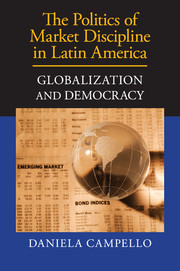Book contents
- Frontmatter
- Dedication
- Contents
- List of Illustrations
- List of Tables
- Acknowledgments
- 1 Globalization, Democracy, and Market Discipline
- 2 Between Votes and Capital: Redistribution and Uncertainty in Unequal Democracies
- 3 Investors' “Vote” in Presidential Elections
- 4 The Politics of Currency Booms and Crises: Explaining the Influence of Investors' “Vote”
- 5 Currency Crisis, Policy Switch, and Ideological Convergence in Brazil
- 6 Exogenous Shocks and Investors' Political Clout in Ecuador
- 7 One President, Different Scenarios: Crisis, Boom, and Market Discipline in Venezuela
- 8 “Vivir con Lo Nuestro”: Default and Market Discipline in Argentina
- 9 Who Governs? Market Discipline in the Developed World
- 10 Conclusion: Markets' Vote and Democratic Politics
- References
- Index
1 - Globalization, Democracy, and Market Discipline
Published online by Cambridge University Press: 05 April 2015
- Frontmatter
- Dedication
- Contents
- List of Illustrations
- List of Tables
- Acknowledgments
- 1 Globalization, Democracy, and Market Discipline
- 2 Between Votes and Capital: Redistribution and Uncertainty in Unequal Democracies
- 3 Investors' “Vote” in Presidential Elections
- 4 The Politics of Currency Booms and Crises: Explaining the Influence of Investors' “Vote”
- 5 Currency Crisis, Policy Switch, and Ideological Convergence in Brazil
- 6 Exogenous Shocks and Investors' Political Clout in Ecuador
- 7 One President, Different Scenarios: Crisis, Boom, and Market Discipline in Venezuela
- 8 “Vivir con Lo Nuestro”: Default and Market Discipline in Argentina
- 9 Who Governs? Market Discipline in the Developed World
- 10 Conclusion: Markets' Vote and Democratic Politics
- References
- Index
Summary
Early in 2002, Brazil was considered an example of a successful emerging economy, praised in international financial markets for its sound economic conditions. Despite concerns over the country's public debt, long-term prospects seemed promising. Optimism was such that the president of the Brazilian central bank was elected “Man of the Year” by Latin Finance magazine after his successful managing of the country's 1998 financial crisis.
In the course of the year, however, the country risk doubled, stock prices fell 50 percent, and the currency plummeted – a remarkable change in market sentiment, driven by investors' anticipation that the leftist Workers' Party (PT) would win the October presidential election. Lula da Silva, PT candidate and formerly a prominent labor leader, had been a vocal opponent of the neoliberal agenda advanced by the incumbent administration, and was expected to reverse it if elected.
The consequences of this so-called confidence crisis were not circum-scribed to financial markets; public accounts deteriorated and important sectors of the economy that held a high share of dollar-denominated debt were left in dire straits. Accelerating inflation further raised fears that the country's economic stabilization was in jeopardy.
Even though opponents capitalized on market fears, the crisis did not prevent voters from electing Lula by a landslide. What it did, however, was to change the balance of power within the party leadership in favor of its most conservative members, with important effects on the way the Workers' Party would govern Brazil.
PT's interlocutors with financial markets, who worked to restore investors' confidence by credibly signaling their commitment to economic orthodoxy during the campaign, would later assume key positions in the administration. A former CEO of BankBoston, and member of the opposition, was appointed head of the Brazilian Central Bank, after PT historical economists were set aside for being considered “too partisan” in financial market reports.
The government ended up adopting an investor-oriented agenda, which frustrated traditional allies and provoked the exodus of party members but sparked euphoria among market players and creditor governments.
- Type
- Chapter
- Information
- The Politics of Market Discipline in Latin AmericaGlobalization and Democracy, pp. 1 - 25Publisher: Cambridge University PressPrint publication year: 2015

